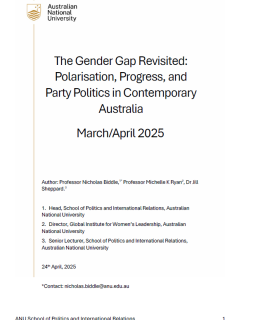
Abstract
The 2022 federal election in Australia saw gender emerge as a defining issue, driven by the rise of high-profile female independent candidates and public debates on women’s treatment in politics and the workplace. In the lead-up to the 2025 federal election, this paper draws on new data from Wave 3 of the 2025 Election Monitoring Survey Series (EMSS) with a sample of 3,608 respondents, building on results from earlier waves and the April 2022 ANUpoll, to examine shifts in public opinion on gender equality, sexual harassment, candidate preference, and the political implications of these attitudes.
Australians continue to express strong support for gender equality, but the intensity of support has declined. The share who view gender equality as "very important" fell from 84.9 per cent in 2022 to 70.3 per cent in 2025, while those who believe Australia has gone “too far” in promoting equality has doubled to 19.0 per cent. These shifts are particularly pronounced among men. Beliefs about who has it easier—men or women—remain gendered, though the perception that women have it easier has increased across the population.
Drawing on additional survey items from the Pew Research Center, Australians are more likely to believe that women have made progress over the past two decades than men, though concerns persist—particularly around romantic relationships and leadership roles. While most Australians view changing gender roles positively, a growing share perceive negative impacts on men.
These findings suggest that gender remains a key dimension of political polarisation in Australia, with implications for party strategy, policy communication, and electoral outcomes in 2025.
File attachments
| Attachment | Size |
|---|---|
| The-gender-gap-revisited---For-web.pdf(533.04 KB) | 533.04 KB |